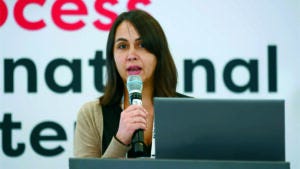- Sponsored Content
- Cell Therapies
How Emerging Technology Is Improving the Cell Therapy Manufacturing LandscapeHow Emerging Technology Is Improving the Cell Therapy Manufacturing Landscape
August 21, 2023
Sponsored by ElevateBio
 Mercedes Segura Gally, Vice President of Process Development, ElevateBio.
Mercedes Segura Gally, Vice President of Process Development, ElevateBio.
Mercedes Segura Gally introduced the audience to ElevateBio, gave a short overview of the state-of-the-field in cell therapies, and discussed key drivers for innovation in the cell therapy space. She highlighted current manufacturing tools and upcoming technical innovations. ElevateBio is based in the Waltham, MA, area. It was founded in 2017 to develop technologies to advance cell and gene therapy products, including offering the chemistry, manufacturing, and controls (CMC) infrastructure to move candidates from preclinical to commercial development. One group is devoted to gene editing capabilities, a research group focuses on technologies for induced pluripotent stem cells (iPSCs), and a third group focuses on cell, protein, and vector engineering.
Through its Basecamp unit, ElevateBio hosts the CMC infrastructure. Teams focus on process innovation, process development, and GMP manufacturing, all under the same roof. The company works with lentiviral vectors and AAVs and on autologous, allogenic, in vivo, and iPSC-derived therapies.
Segura Gally described the company’s toolbox for genetic modification. Then, for the rest of her presentation, she focused on the challenges of creating cell therapies, “the transfer of living cells into patients to lessen or cure disease.” She began by explaining that the current manufacturing infrastructure cannot support the expected growth of cell therapies based on current and anticipated patient demand. Much of the work still involves manual operations, which increase the difficulties of scaling up or out, generating final costs that are prohibitive for most markets outside of the United States. She observed that many cost and scale challenges are attributable to a rate of scientific innovation and increasing technological complexity that is faster than the rate at which new manufacturing technologies are being implemented. Even with the surge in investment for new solutions for cell therapy manufacturing, those solutions are not happening fast enough for the therapies to become commercially viable.
Cost factors for cell therapies incorporate investments in facilities, equipment, people, and consumable reagents. Highly trained operators are required, especially for manual operations within open processes. Because of the still-emerging nature of the modality, many raw materials are being supplied by single vendors, and plasmid and vector production processes are still being optimized. Innovations in analytics are ongoing to make assays more robust. Autologous therapies require increased integration of unit operations, closing of the systems, and reduction of manual processing.
She offered a history of cell-therapy development, beginning when most such therapies were made at decentralized locations (hospitals and universities) in lengthy manual, laboratory-scale processes. By contrast, these days the industry is developing tools that allow for fewer hands-on activities and more closed systems. Manufacturing has moved to specialized CDMOs. More cell-engineering tools are available, and clinical trials are advancing faster and with larger patient numbers.
Her thoughts about future scenarios included a completely decentralized model that allows cells to be genetically modified on site for in vivo delivery of genetic materials to patients. A variation of this model would include completely automated robotics and manufacturing systems to produce multiple batches at the same time in less manual, closed systems.
Segura Gally completed her presentation by talking about the process development team at ElevateBio and what the team is working on in the emerging technologies laboratory. She appreciates how her team is dedicated to all critical paths to evaluate new technologies. With new reagents and new, automatable unit operations, the team is devoted to incorporating new technologies and creating better processes and products.
Fill out the form below to view the full presentation now.
You May Also Like






